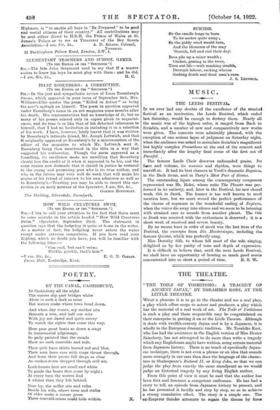MUS IC.
THE LEEDS FESTTVAIr.
IF we ever had any doubts of the excellence of the musical festival as an institution, the Leeds Festival, which- ended last Saturday, would be enough to destroy them. Nearly all the music was of the highest order, it ranged from- Bach to Scriabin, and a number of new and comparatively new works were given. The concerts were admirably planned, with the exception of one serious lapse of judgment on Saturday night, when the audience was asked to assimilate Scriabin's magnificent but highly complex Prometheus at the end of the concert and immediately after the lengthy final scene of the first act of Parsifal.
The famous Leeds Choir deserves unbounded praise. Its force and volume, its nuances and rhythm, were things to marvel at. It had its best chances in Verdi's dramatic Requiem, in the Bach items, and in Parry's Blest Pair of Sirens.
The outstanding figure among the contemporary composers represented was Mr. Hoist, whose suite The Planets was per- formed in its entirety, and, later in the Festival, his new choral work, Ode to Death. The former is too well known to need mention here, but we must record the perfect performance of the chorus of sopranos in the wonderful ending of Neptune, when the voices die away into silence and we seem to be listening with strained ears to sounds from another planet. The Ode to Death was received with the enthusiasm it deserved ; it is a short work of reserved and severe beauty.
By no means least in order of merit was the last item of the Festival, the excerpts from Die Meistersinger, including the famous Quintet, which was perfectly sung.
Miss Dorothy Silk, to whom fell most of the solo singing, delighted us by her purity of tone and depth of expression.
It is difficult to believe that, until the next Leeds Festival, we shall have no opportunity of hearing so much good music concentrated into so short a period of time. E. S. W.


































 Previous page
Previous page